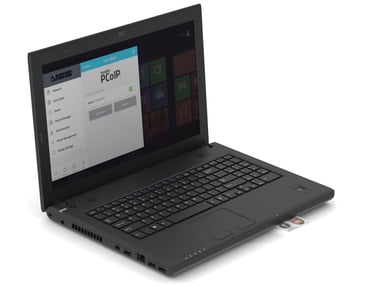Organizations look to implement desktop or end point virtualization for many reasons, including enhanced security, lowering costs, reducing IT complexity - even lowering energy consumption. Virtualized end points are particularly effective in meeting these objectives as infrastructure management and data are centralized in the data center.
Virtual Desktop Infrastructure (VDI) implementation continues to grow, but many IT managers and users still have limited experience with the technology - mostly as an immobile desktop implementation consisting of a monitor, keyboard, mouse and small desktop networking device. This description fits both thin and zero clients. In fact, thin and zero client devices may look identical. But do not be fooled!
Under the skin, a thin client has significant disadvantages, such as an embedded OS, flash memory and some local storage. All of these things can lead to security issues and increased IT complexity.
There are at least seven good reasons to choose zero client technology over a thin client every time. A zero client has:
- NSA Suite B security
- AES 256 Encryption
- No Hard Drive
- No OS
- No Local Storage
- No Persistent User Data
- No Need for Antivirus Protection
Laptop/notebook zero clients, such as the NCS Cirrus LT and Cirrus LT Plus, make it more convenient for a typical knowledge worker to stay connected securely on a business trip, or from a home office or beach house over the weekend.
Cirrus LT Plus has a 15.6-inch FHD display, and a full keyboard with numeric keypad. In addition, it has a primary hot-swappable battery with an additional integrated second battery for more than eight hours of continuous power. Its plethora of useful options include integrated smart card reader, proximity card reader, fingerprint reader, docking station, WiFi and 4G broadband.
In addition to mobility, some IT folks need portability in their virtualization plan. That's where the Cirrus DT WiFi comes into play. This new desktop zero client is ideal for healthcare applications and other implementations where virtual end points must be low cost yet portable and WiFi connectivity is preferred for superior manageability, security and productivity. Portable desktop zero clients have applications on medical carts, in aviation hangers, on factory floors, and in remote workspaces. Unique firmware in the DT WiFi enables the control and management of the WiFi subsystem locally and remotely.
The many flavors of NCS zero client desktops and laptops ensure there is one for any business need. Cirrus LT computers use the Teradici PCoIP protocol to ensure superior performance.
To learn more about NCS PCoIP zero client solutions, download the brochure!


